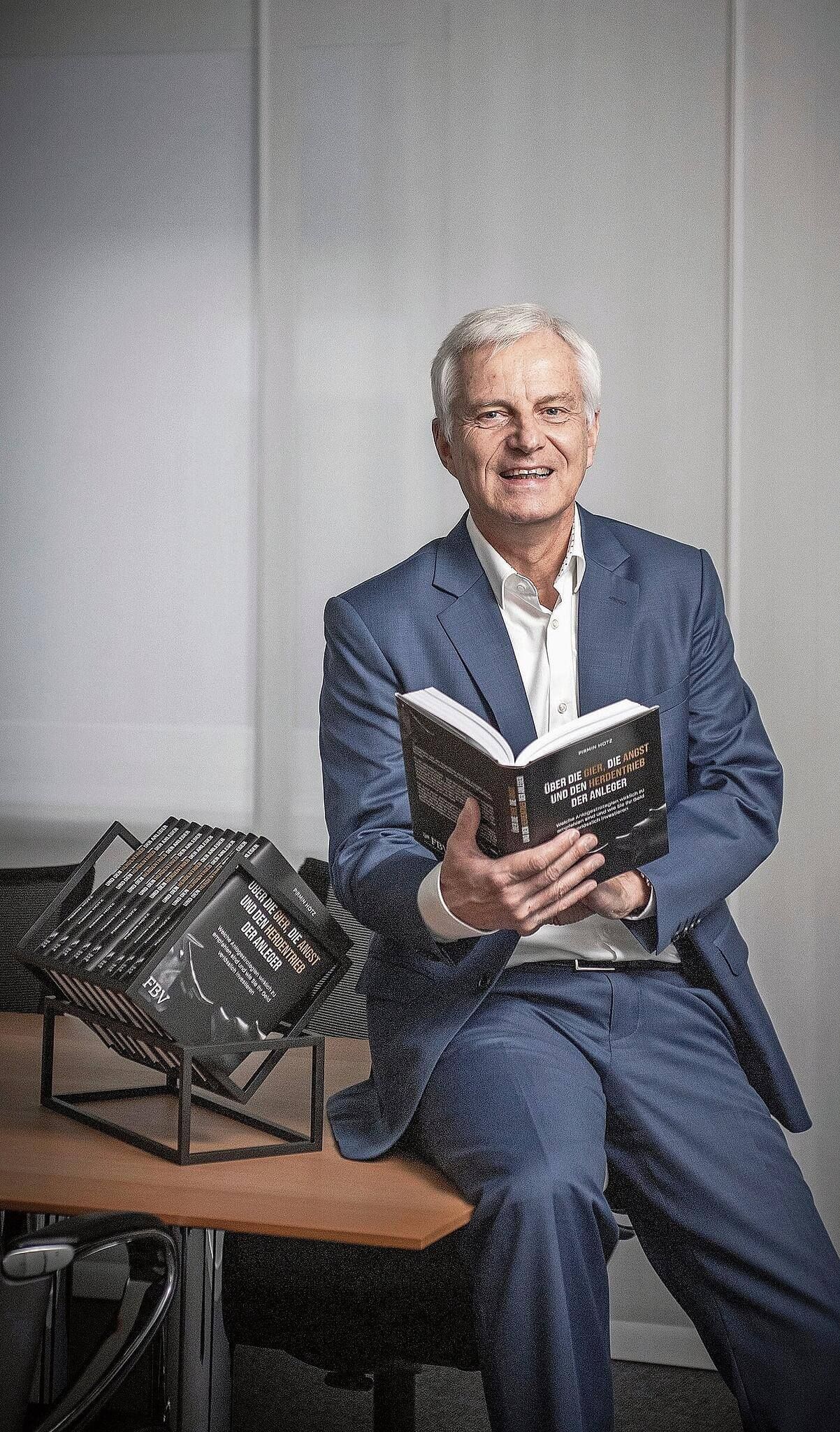
«An unusually good year on the stock market»
Asset manager Pirmin Hotz on investment success, luck and problematic cases like Nestlé and Swatch.
Was 2024 a good year on the stock market?
Pirmin Hotz: An unusually good year, I would say. Steadily rising prices, no major setbacks, no crises or scandals like Credit Suisse – it was a year of sunshine for our clients and for us. I assume you journalists would have liked a bit more spectacle.
We had Donald Trump. Does he worry you?
More in a political sense than a stock market one. But of course, with Donald Trump, a very unpredictable man is coming to power in America. And uncertainty is bad for the stock market climate, especially since we have just had two very good years. I expect significantly larger price fluctuations in 2025.
How are you preparing for the rollercoaster ride?
Not at all. Our clients’ assets firstly consist of solid stocks, secondly, far behind, good real estate and thirdly – to smooth out fluctuations – safe bonds. Depending on the market situation, we shift the weighting a little to boost performance as opportunities arise.
How does that work in practice?
For example, last year we sold some stocks for many clients and invested the realised profits in bonds. If there are setbacks in 2025, we will do the opposite – buy stocks, sell bonds.
Could you explain your approach to selecting stocks?
We diversify our stock portfolio by industry. Doing so also allows us to achieve the desired geographic risk diversification. This works very well with multinational Swiss companies. That’s why just over a third of the stocks we hold are Swiss equities. Just under two-thirds are foreign equities – exclusively from democratic industrialised nations. Depending on their wealth, our clients hold between 35 and 60 different stocks.
How do you select these equities?
We buy the proven global market leaders in their respective industries. This leads to positions in Nestlé, Unilever, Johnson & Johnson, Roche, Novartis, and so on. This stock selection builds on our awareness that a system that allows anyone to find white truffles in deeper layers simply does not exist.
Nestlé is currently losing its reputation as a global champion. With you as well?
Nestlé’s performance is very disappointing. The strategy of former CEO Mark Schneider failed. Under him, investments were made that have simply not worked. The management – partly to appease the financial market – sold off low-margin sectors and purchased high-margin businesses. That was a miscalculation.
In what way?
Acquisitions in the area of functional, medical nutrition, for example, cost multiple times what Nestlé could gain from the sale of the low-margin frozen pizza business. If you want to exchange these businesses without destroying value, the price on both sides has to be right. That was not the case. Businesses with high revenue and less profit than hoped were swapped for businesses with low revenue and high profit, resulting in less profit for less revenue overall.
Will you still hold onto Nestlé?
Yes. I am convinced the company will overcome this crisis. But the shares have, of course, lost their reputation as a “widows and orphans” investment.
Was the reputation of Nestlé shares as virtually risk-free ever justified?
No. Equity capital is risk capital, and shareholders inherently bear high risks. However, Nestlé shares previously earned more trust than other equities. There were, however, severe exaggerations during the COVID crisis. Many bought Nestlé shares in the expectation that the high dividend could be a substitute for low-interest bonds. That was mindless. At least now everyone has realised once again that Nestlé shares are also risky investments.
What would have to occur for you to remove Nestlé from your clients’ portfolios?
We make these decisions when the trust is gone and the risk of collapse reaches a level we can no longer bear. However, we are still far from that in the case of Nestlé.
Can there be other reasons for selling a stock? The Swatch Group, for instance, is a major disappointment.
The management under Nick Hayek is unfortunately not shareholder-friendly. I often see journalists’ and investors’ questions not being taken seriously. That is frustrating. But there are great treasures hidden in the corporation’s balance sheet. The company owns a lot of very valuable real estate. The liabilities side of the balance sheet consists almost entirely of equity. Actually, Swatch Group shares would perfectly fit us in terms of their substance. But it seems to me they are doing everything to chase investors away.
Yet you don’t have to let yourself be chased away.
There is a risk that the stock will be talked down by management until it becomes worthwhile for the family to take over the company entirely and delist the shares. We have been shareholders in the Swatch Group for a very long time and, like many others, have borne the share price declines of recent years in full. Should the described scenario occur, these book losses would become real losses overnight. That is our biggest risk with the Swatch Group.
«The management under Nick Hayek is unfortunately not shareholder-friendly.»
Back to Nestlé & Co: Is it possible that managers prefer to make deals rather than streamline existing businesses?
I suspect that, too. I assume that in every generation of managers there are people with a strong urge to make history and the deal of the century. But it is almost a law of nature that such success is associated with as many risks as opportunities.
You told us a year ago that you bade farewell to all automobile and bank shares ten years ago. Is there a scenario in which UBS and other bank shares could return to your portfolio?
I agree with renowned scholars like Anat Admati, Simon Johnson or Martin Heller: They all demand 20 percent common equity tier 1. This is around four times what UBS is currently reporting. If regulation were to go in this direction, banks could withstand major shocks like the financial crisis.
Shouldn’t they already be able to do so?
Indeed, the financial crisis was 15 years ago. But Credit Suisse was so weak that it could collapse even in a boom phase. Imagine a crisis where stock markets crash by 40 to 50 percent or more, which has happened repeatedly in history. These are the crises that banks must withstand to no longer pose a threat to the whole economy and financial stability. It’s far too easy to claim that the downfall of Credit Suisse was merely a trust issue. Trust, equity, liquidity – it all belongs together. So, UBS is doing a good job at the moment. But for these stocks to become relevant for us again, there must be massive changes in capital regulations. I don’t think I will live to see it.
Asset managers like you often talk about long-term success. You always refer to statistics showing that shares have gained an average of 7 to 9 percent in value per year over the past 100 years. Why do you believe this will continue?
If you believe share prices won’t rise enough over the next 50 years to compensate investors for their risk, then the market-driven world we live in now will come to an end. Perhaps then we will live in a state where there is no private ownership. That is a dreadful notion for me.
But perhaps a 10- or 15-year interruption in the stock boom is enough for certain paradigms to falter.
Such interruptions, even of this length, have indeed occurred over the past 100 years. But the sharp upwards trajectory then returned. We humans want to be productive and inventive. Companies generate and accumulate productive capital, make profits, distribute dividends, and so on. Therefore, stock prices in the world I want to live in must keep rising.
But you’ve never experienced a 15-year stagnation phase yourself. Did you just have the luck of being born late?
Not so fast! I started as an asset manager in 1986. In 1987, I experienced the first crash: Down 22 percent in one day. I had just bought a new Telekurs device and when I looked at it, I thought at first: Damn, it’s new and already broken. Then came the Iraq crisis in 1990: another minus 22 percent. 1994 – the Tequila crisis in Mexico. 1998 – the Russia crisis: minus 20 percent. The dot-com bubble started to burst in 2001, and stock prices had halved by 2003. And they halved again from 2007 to 2009. Prices cut in half on two occasions within a decade – that has never happened before. And let us not forget the coronavirus crisis: The SMI fell by over 25 percent within weeks.
Author
Daniel Zulauf (External)
Dr. Pirmin Hotz,
64, founded his eponymous asset management firm in 1986. Based in Baar ZG, it now has 26 employees. In 2021, he wrote a wide-ranging book on investment strategies entitled On the Greed, Fear and Herd Instincts of Investors [Über die Gier, die Angst und den Herdentrieb der Anleger]. Pirmin Hotz is the father of three adult children. (dz)

Asset manager Pirmin Hotz generated returns of 14 percent with stocks in 2024 – on average over the years it has been 9 percent, but in the future it will be more like 6 per cent. Picture: Pius Amrein
- Anti-cyclical
- Diversification
- Long-term
- Forecasts







